Having delved deeply into the life and times of Ambrose Gwinnet Bierce–“Almighty God Bierce” in his humbler manifestation–the imbecility of modern politics and its complete lack of moral compass strikes me as perfectly suited to the cynical temperament of that great American lexicographer and curmudgeon.
It is therefore entirely apropos to go to Ambrose Bierce’s voluminous writings to glean some pity pearls of venom to lay on the modern body politic. In Medieval Wales satiric poetry was forbidden, for it was considered a form of sorcery and skilled bards were reputed to be able to cause boils to appear on the skin of persons who were the subject of their satire. While Bierce was never brought up on charges of witchcraft, his satire was nevertheless prodigious and he was particularly skilled with his poison darts when the subjects of his ire were pompous politicians or incompetent generals. In consideration of the upcoming Presidential election year therefore, I present a short lexicographical essay by the Master as edited by myself on his behalf, as he is somewhat indisposed, somewhere in Mexico at the moment.
A POLITICAL GLOSSARY
Ambrose Bierce
ABDICATION, n. An act whereby a sovereign attests his sense of the high temperature of the throne.
ADMINISTRATION, n. An ingenious abstraction in politics, designed to receive the kicks and cuffs due to the premier or president. A man of straw, proof against bad-egging and dead-catting.
ALDERMAN, n. An ingenious criminal who covers his secret thieving with a pretence of open marauding.
ALLEGIANCE, n.
This thing Allegiance, as I suppose,
Is a ring fitted in the subject’s nose,
Whereby that organ is kept rightly pointed
To smell the sweetness of the Lord’s anointed.
ALLIANCE, n. In international politics, the union of two thieves who have their hands so deeply inserted in each other’s pockets that they cannot separately plunder a third.
ARISTOCRACY, n. Government by the best men. (In this sense the word is obsolete; so is that kind of government.) Fellows that wear downy hats and clean shirts—guilty of education and suspected of bank accounts.
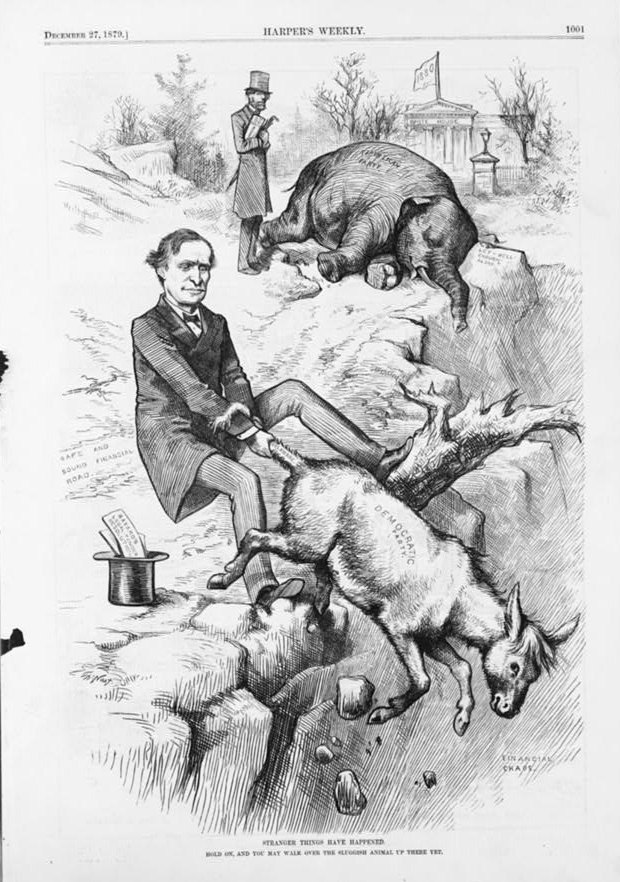
CAPITAL, n. The seat of misgovernment. That which provides the fire, the pot, the dinner, the table and the knife and fork for the anarchist; the part of the repast that himself supplies is the disgrace before meat. Capital Punishment, a penalty regarding the justice and expediency of which many worthy persons—including all the assassins—entertain grave misgivings.
CONGRESS, n. A body of men who meet to repeal laws.
CONSERVATIVE, n. A statesman who is enamored of existing evils, as distinguished from the Liberal, who wishes to replace them with others.
CONSUL, n. In American politics, a person who having failed to secure an office from the people is given one by the Administration on condition that he leave the country
CORPORATION, n. An ingenious device for obtaining individual profit without individual responsibility
CORSAIR, n. A politician of the seas.
CYNIC, n. A blackguard whose faulty vision sees things as they are, not as they ought to be. Hence the custom among the Scythians of plucking out a cynic’s eyes to improve his vision.
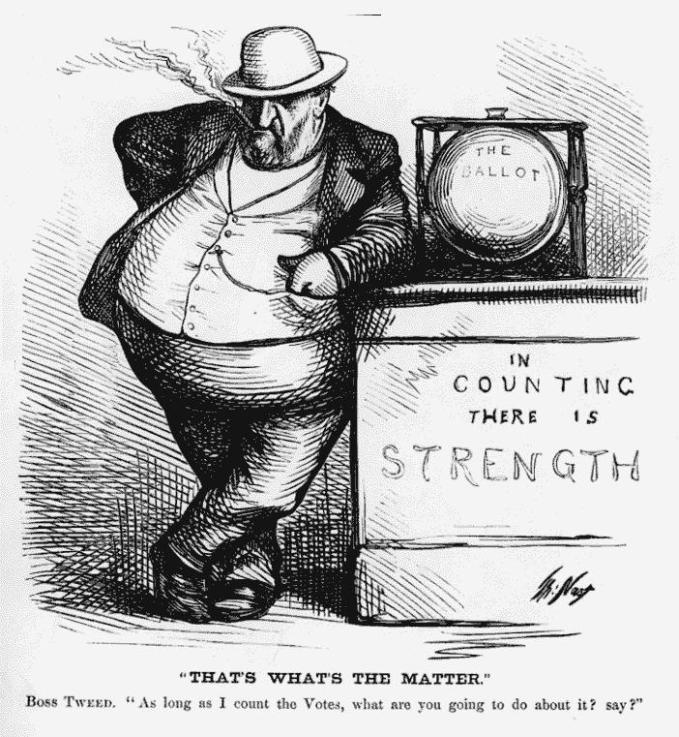
DUTY, n. That which sternly impels us in the direction of profit, along the line of desire
ELECTOR, n. One who enjoys the sacred privilege of voting for the man of another man’s choice.
EMANCIPATION, n. A bondman’s change from the tyranny of another to the despotism of himself
EXECUTIVE, n. An officer of the Government, whose duty it is to enforce the wishes of the legislative power until such time as the judicial department shall be pleased to pronounce them invalid and of no effect.
EXILE, n. One who serves his country by residing abroad, yet is not an ambassador. An English sea-captain being asked if he had read “The Exile of Erin,” replied: “No, sir, but I should like to anchor on it.” Years afterwards, when he had been hanged as a pirate after a career of unparalleled atrocities, the following memorandum was found in the ship’s log that he had kept at the time of his reply:
Aug. 3d, 1842. Made a joke on the ex-Isle of Erin. Coldly
received. War with the whole world!
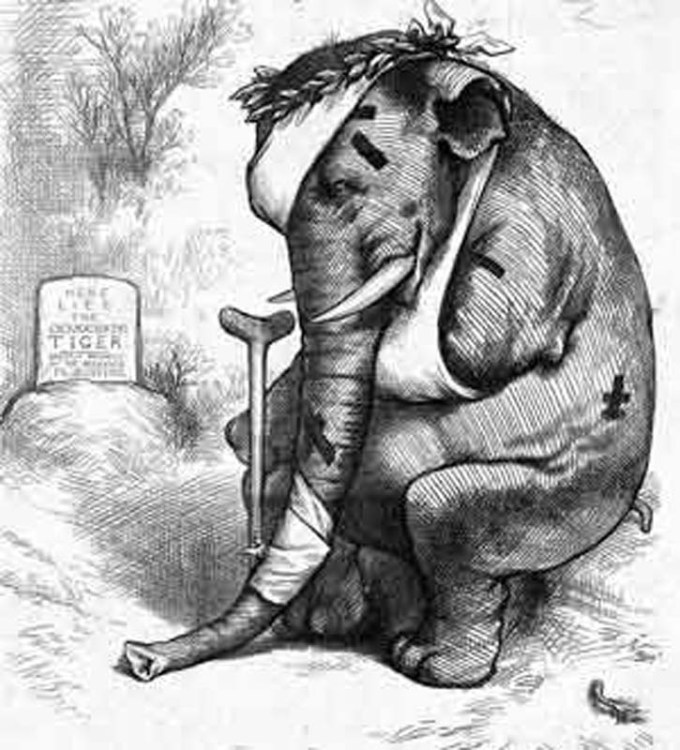
FUTURE, n. That period of time in which our affairs prosper, our friends are true and our happiness is assured.
GRAPESHOT, n. An argument which the future is preparing in answer to the demands of American Socialism.
HONORABLE, adj. Afflicted with an impediment in one’s reach. In legislative bodies it is customary to mention all members as honorable; as, “the honorable gentleman is a scurvy cur.”
HOUSELESS, adj. Having paid all taxes on household goods.
IMMIGRANT, n. An unenlightened person who thinks one country better than another.
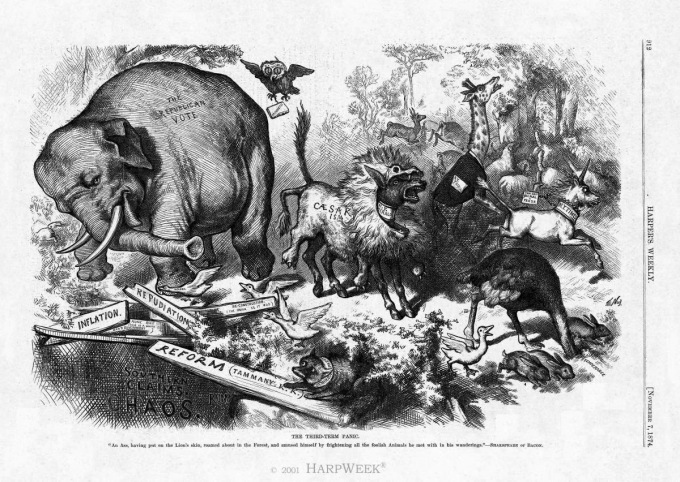
INFLUENCE, n. In politics, a visionary quo given in exchange for a substantial quid
JUSTICE, n. A commodity which is a more or less adulterated condition the State sells to the citizen as a reward for his allegiance, taxes and personal service.
KING, n. A male person commonly known in America as a “crowned head,” although he never wears a crown and has usually no head to speak of.
LAWYER, n. One skilled in circumvention of the law.
LIAR, n. A lawyer with a roving commission.
LITIGANT, n. A person about to give up his skin for the hope of retaining his bones.
LITIGATION, n. A machine which you go into as a pig and come out of as a sausage.
MAJESTY, n. The state and title of a king. Regarded with a just contempt by the Most Eminent Grand Masters, Grand Chancellors, Great Incohonees and Imperial Potentates of the ancient and honorable orders of republican America.
MAMMON, n. The god of the world’s leading religion. The chief temple is in the holy city of New York.
MINISTER, n. An agent of a higher power with a lower responsibility. In diplomacy and officer sent into a foreign country as the visible embodiment of his sovereign’s hostility. His principal qualification is a degree of plausible inveracity next below that of an ambassador.
MUGWUMP, n. In politics one afflicted with self-respect and addicted to the vice of independence. A term of contempt
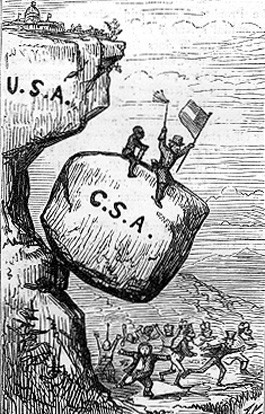
PANDEMONIUM, n. Literally, the Place of All the Demons. Most of them have escaped into politics and finance, and the place is now used as a lecture hall by the Audible Reformer. When disturbed by his voice the ancient echoes clamor appropriate responses most gratifying to his pride of distinction.
PATRIOT, n. One to whom the interests of a part seem superior to those of the whole. The dupe of statesmen and the tool of conquerors.
PATRIOTISM, n. Combustible rubbish read to the torch of any one ambitious to illuminate his name.
In Dr. Johnson’s famous dictionary patriotism is defined as the last resort of a scoundrel. With all due respect to an enlightened but inferior lexicographer I beg to submit that it is the first.
PEACE, n. In international affairs, a period of cheating between two periods of fighting.
POLITICS, n. A strife of interests masquerading as a contest of principles. The conduct of public affairs for private advantage.
POLITICIAN, n. An eel in the fundamental mud upon which the superstructure of organized society is reared. When he wriggles he mistakes the agitation of his tail for the trembling of the edifice. As compared with the statesman, he suffers the disadvantage of being alive.
PRESIDENCY, n. The greased pig in the field game of American politics.
PRESIDENT, n. The leading figure in a small group of men of whom— and of whom only—it is positively known that immense numbers of their countrymen did not want any of them for President.
QUEEN, n. A woman by whom the realm is ruled when there is a king, and through whom it is ruled when there is not.
RABBLE, n. In a republic, those who exercise a supreme authority tempered by fraudulent elections. The rabble is like the sacred Simurgh, of Arabian fable—omnipotent on condition that it do nothing. (The word is Aristocratese, and has no exact equivalent in our tongue, but means, as nearly as may be, “soaring swine.”)
REAR, n. In American military matters, that exposed part of the army that is nearest to Congress
RECOUNT, n. In American politics, another throw of the dice, accorded to the player against whom they are loaded.
REPUBLIC, n. A nation in which, the thing governing and the thing governed being the same, there is only a permitted authority to enforce an optional obedience. In a republic, the foundation of public order is the ever lessening habit of submission inherited from ancestors who, being truly governed, submitted because they had to. There are as many kinds of republics as there are graduations between the despotism whence they came and the anarchy whither they lead.
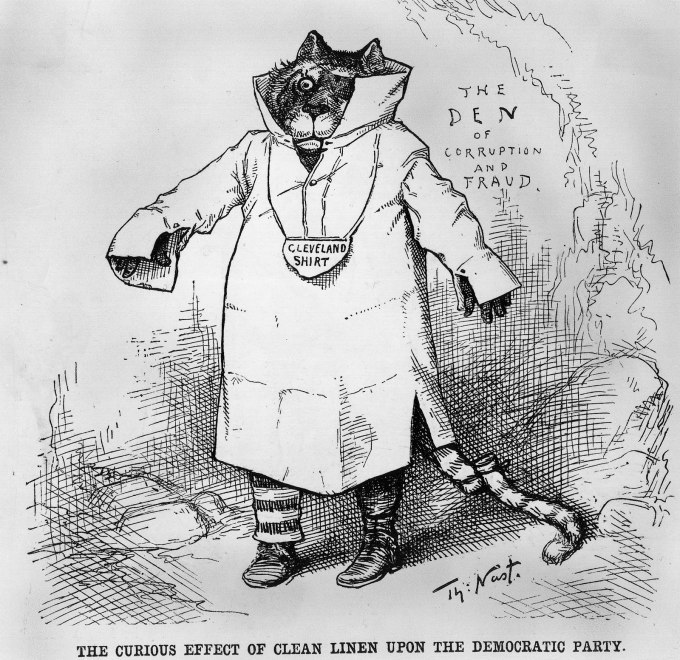
REVOLUTION, n. In politics, an abrupt change in the form of misgovernment. Specifically, in American history, the substitution of the rule of an Administration for that of a Ministry, whereby the welfare and happiness of the people were advanced a full half-inch. Revolutions are usually accompanied by a considerable effusion of blood, but are accounted worth it—this appraisement being made by beneficiaries whose blood had not the mischance to be shed. The French revolution is of incalculable value to the Socialist of to-day; when he pulls the string actuating its bones its gestures are inexpressibly terrifying to gory tyrants suspected of fomenting law and order.
ROUNDHEAD, n. A member of the Parliamentarian party in the English civil war—so called from his habit of wearing his hair short, whereas his enemy, the Cavalier, wore his long. There were other points of difference between them, but the fashion in hair was the fundamental cause of quarrel. The Cavaliers were royalists because the king, an indolent fellow, found it more convenient to let his hair grow than to wash his neck. This the Roundheads, who were mostly barbers and soap-boilers, deemed an injury to trade, and the royal neck was therefore the object of their particular indignation. Descendants of the belligerents now wear their hair all alike, but the fires of animosity enkindled in that ancient strife smoulder to this day beneath the snows of British civility.
RUSSIAN, n. A person with a Caucasian body and a Mongolian soul. A Tartar Emetic
SCEPTER, n. A king’s staff of office, the sign and symbol of his authority. It was originally a mace with which the sovereign admonished his jester and vetoed ministerial measures by breaking the bones of their proponents.
SENATE, n. A body of elderly gentlemen charged with high duties and misdemeanors
TRUST, n. In American politics, a large corporation composed in greater part of thrifty working men, widows of small means, orphans in the care of guardians and the courts, with many similar malefactors and public enemies.
ULTIMATUM, n. In diplomacy, a last demand before resorting to concessions.
Having received an ultimatum from Austria, the Turkish Ministry met to consider it.
“O servant of the Prophet,” said the Sheik of the Imperial Chibouk to the Mamoosh of the Invincible Army, “how many unconquerable soldiers have we in arms?”
“Upholder of the Faith,” that dignitary replied after examining his memoranda, “they are in numbers as the leaves of the forest!”
“And how many impenetrable battleships strike terror to the hearts of all Christian swine?” he asked the Imaum of the Ever Victorious Navy.
“Uncle of the Full Moon,” was the reply, “deign to know that they are as the waves of the ocean, the sands of the desert and the stars of Heaven!”
For eight hours the broad brow of the Sheik of the Imperial Chibouk was corrugated with evidences of deep thought: he was calculating the chances of war. Then, “Sons of angels,” he said, “the die is cast! I shall suggest to the Ulema of the Imperial Ear that he advise inaction. In the name of Allah, the council is adjourned.”
UN-AMERICAN, adj. Wicked, intolerable, heathenish
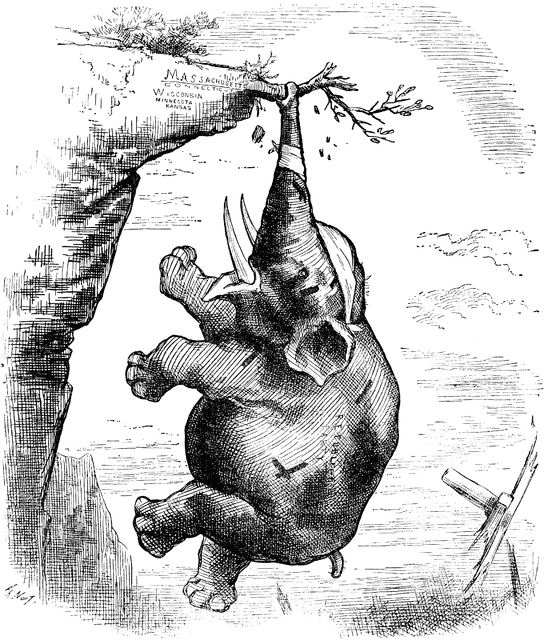
VOTE, n. The instrument and symbol of a freeman’s power to make a fool of himself and a wreck of his country.
WALL STREET, n. A symbol for sin for every devil to rebuke. That Wall Street is a den of thieves is a belief that serves every unsuccessful thief in place of a hope in Heaven.
WAR, n. A by-product of the arts of peace. The most menacing political condition is a period of international amity. The student of history who has not been taught to expect the unexpected may justly boast himself inaccessible to the light. “In time of peace prepare for war” has a deeper meaning than is commonly discerned; it means, not merely that all things earthly have an end—that change is the one immutable and eternal law—but that the soil of peace is thickly sown with the seeds of war and singularly suited to their germination and growth.
WASHINGTONIAN, n. A Potomac tribesman who exchanged the privilege of governing himself for the advantage of good government.
For more about the life and times of Ambrose Bierce, read Ambrose Bierce and the Period of Honorable Strife, an in depth look at the American author’s military service during the Civil War.
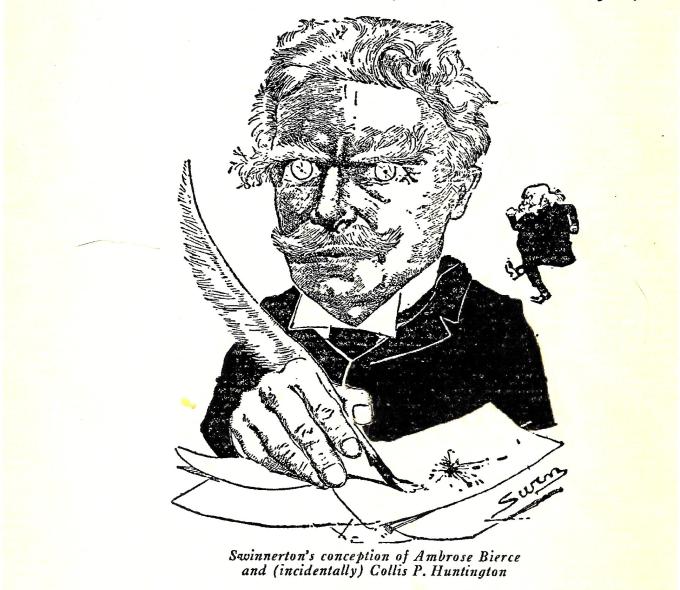
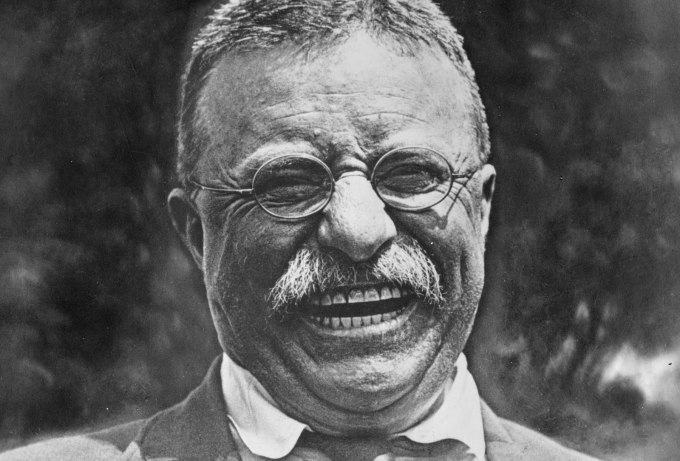 Teddy Roosevelt (1913)
Teddy Roosevelt (1913)







